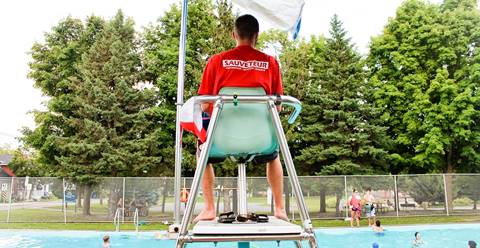Lifeguard on duty

As a lifeguard, you know how crucial it is to keep your knowledge and skills up-to-date.
There are many ways to do this:
- The first one is extremely important – and even mandatory: it is, of course, the recertification process, during which your lifeguarding skills and knowledge are put to the test.
- Regular training is also essential. It must focus on lifeguarding techniques, emergency procedures, first aid and, of course, fitness and the required physical skills. Did you know that joining a lifesaving club is an excellent way to train?
- Finally, reviewing theory is another key element to staying up-to-date. Read the Alerte magazine and revise your course material!
In this section, you will find various reference publications that any lifeguard will find particularly useful in their daily life!
Swimming: For Better or Worse!
Swimming is one of the most accessible and popular recreational and sporting activities. Therefore, it's not surprising that as soon as the warm summer days arrive, our pools, lakes, and wading pools fill up with swimmers. What consequences can overcrowding, poor maintenance of the filtration/chlorination system, or failure to comply with Q-2, r.39 standards have on the health of your swimmers? And does open water pose fewer health risks?
Read more (in french only)
Noise in Five Indoor Pools: Measurement of Ambient Levels and Sound Exposure
The ambient noise level in indoor pools can be very high, especially when young children are present. While this noise may be unpleasant for users, it can become a health risk for workers, whether they are lifeguards, instructors, or coaches.
Read more (in french only)
Who is responsible?
It’s no secret, the Lifesaving Society is the expert in aquatic supervision in Canada. Thanks to properly trained and educated lifeguards, among others, there are fewer drownings, especially when these lifeguards put into practice what they have learned in our training programs. Swimmers can rest assured when they see lifeguards at their posts, clearly identified, with their pocket mask at their waist and rescue equipment in hand, keeping a watchful eye on the users, ready to intervene at any moment should an emergency arise. It’s even more reassuring when you’ve seen the lifeguards train beforehand.
Read more (in french only)
SAFETY MANAGEMENT: EVACUATION OF A SWIMMING AREA
Safety management is not something that can be improvised. Here are some key elements to keep in mind when planning, practicing, or carrying out the evacuation of a swimming area.
Read more (in french only)
Oxygen Therapy, Advanced Ventilatory Assistance, Sutures: Should These Advanced Interventions Be Integrated into Lifeguard Training?
At the Lifesaving Society, we continuously emphasize the importance for lifeguards to keep their skills up to date, to work on improving emergency procedures, and to regularly practice rescue techniques and first aid. Several questions arise in this regard: which training programs are essential? How far should a lifeguard go in their learning? Is it necessary, for example, for them to be trained to a level equivalent to that of a first responder or paramedic?
Read more (in french only)
Surveillance - Reminder Guide
Because a picture is worth a thousand words.
Infographic (in french only)





